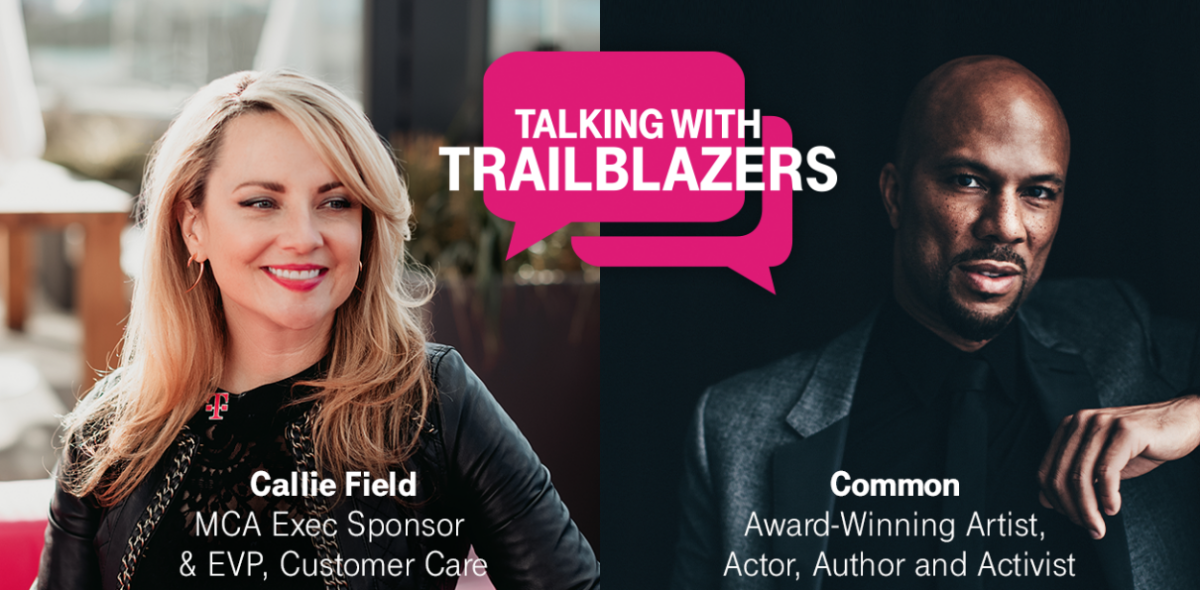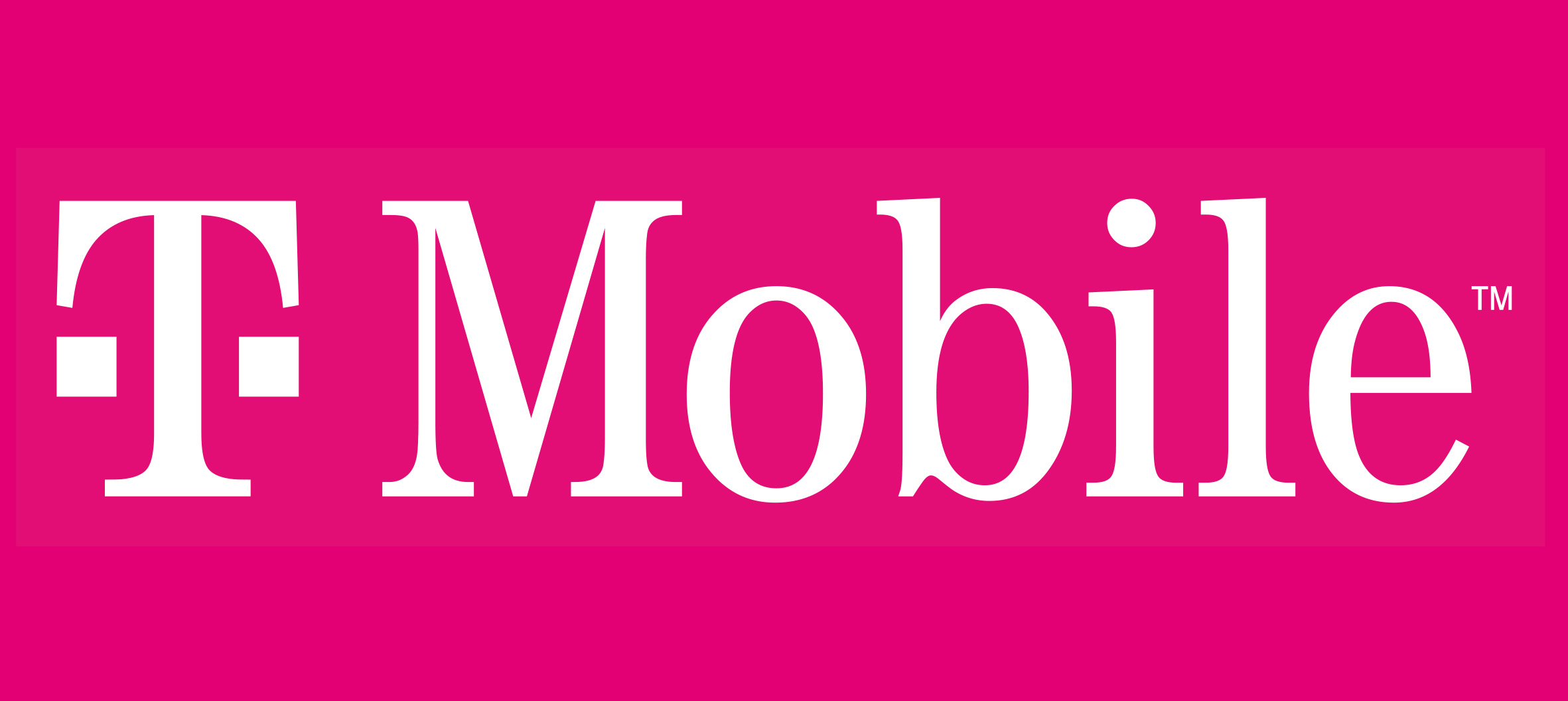5 Tips To a “Common” Sense Approach
In celebration of Black History Month, the rapper, actor, author and activist shared his insights and experiences to help promote diverse narratives and find deeper purpose.

“Gratitude is one of the things that can keep you positive. If you think about the things that you do have and just stay in that att … I was about to say ‘attitude,’ but I didn’t want to rhyme. But, to be honest, your gratitude will change your attitude!”
Common laughed when he tried to stop himself from doing what he does best. But even when the rapper tries to downplay his talents, it seems his creative spark can’t be dimmed. Speaking via livestream to T-Mobile’s Executive Vice President of Customer Care Callie Field, as well as almost five thousand employee audience members, during the company’s virtual Talking with Trailblazers event in recognition of Black History Month, the hip-hop heavyweight’s excitement over the topic at hand was palpable through the computer screen.
“I love the thought and the mantra of ‘excellence in action,’” he said. “The more I’ve trained myself to think about keeping my mind on good things and recognizing that everything that we’ve experienced is actually there for us to be better. Excellence! In action!”
As the winner of an Academy Award and a Golden Globe in 2015 for Best Original Song in a Motion Picture for Glory, as well as numerous Grammys, the author of two memoirs admittedly knows what excellence feels like, and has dedicated himself to helping others understand its power through his social justice and advocacy work, focusing on mass incarceration, mental health and voting rights.
This Talking with Trailblazers installment is the latest in a series of companywide initiatives to celebrate Black History Month and was organized with the help of the company’s Multicultural Alliance and Black Empowerment Network employee resource groups. T-Mobile also kicked off February with a $2 million investment in new scholarship, recruiting and business education programs meant to continue its commitment to Diversity, Equity and Inclusion. The donations focus on programs that serve students at Historically Black Colleges and Universities (HBCUs), aspiring diverse workers in the tech and telecom industries and Black small business owners.
Common had plenty of gems of wisdom to share during the hour-long conversation, topics ranging from the importance of mental and physical health while investing in your purpose to celebrating the incredible contributions of Black writers, musicians and artists and the meaning behind the Black Lives Matter movement, and the recent work of his own nonprofit organizations the Common Ground Foundation and Imagine Justice, dedicated to leveraging the power of art to advocate for communities and fight for justice and equality.
So put on your favorite soundtrack to set the mood — May we suggest starting with the first track on this Black History Month-inspired playlist created by the T-Mobile internal communications team? — and enjoy some invaluable takeaways from this important chat.
1. Gratitude will change your attitude.
“Gratitude is one of the things that can keep you positive. It’s better to think about the things that you are grateful for instead of worrying about the future or living in the past. It changes your mentality, so that’s how I keep a positive outlook and surround myself with positive people and positive energy. I try not to take in things — whether it's news, food, music — that darken my energy and my spirit.”
2. Self-care is a discipline, one that trains you to maintain discipline in all areas of life.
“As a young man, I really didn’t have any health awareness besides exercise. But, at a certain point, I realized that certain things weren’t good for my life. I started caring more and focusing more towards taking care of myself from a diet perspective. Applying discipline to one area of my life helped me feel more powerful. I felt like I had more control of myself. ‘Oh, I have the power to not do these things. Instead, I can use that power to create these other things.’ I recognized that going into the studio after I stopped eating certain things, my voice was clearer. Now I eat a healthier diet. I drink water. I work out. I go into the booth and make sure I do vocal exercises. I pay attention. I strive for a lifestyle of wanting to love myself and a lifestyle of wellness. If you take care of yourself, it shows up in every other aspect of your life, no matter what you’re doing.”
3. The head holds the secret to what the heart wants — mental health is as vital as physical health.
“We all go through some stuff. Everybody. I don’t care how divine, how great, talented, successful, whatever attributes you have that are blessings and incredible. You still go through things. You still go through what we feel as human beings. It shows up in fears, shows up as ways that we are afraid to get close to the other individuals, or ways that we actually channel our own pain on to other individuals or even onto ourselves. Ways that we are not able to love ourselves as much. Sometimes we just don't know the reason why some of these things are happening. Sometimes we know we are doing it and still don’t know why we want to do it. My goal is to be the best human being, the best child of God, I can be, every day. That entails not only the physical things, but the mental and emotional. In fact, I don't care how physically well you are. If you’re not nurturing your mental wellness, you will never live to your full capacity and live a full, happy life. So, I made a decision when I saw myself repeating certain things. After all the great books that I’ve read, and the self-help books, and still continuing to build in my spirituality, I felt like one of the avenues to explore was therapy. If you have something going on physically, you go to the doctor. So why not have that type of support for your mental well-being? It’s proven to be one of the greatest gifts for me in this lifetime.”
4. Live a life of purpose, each and every day.
"I asked myself this question the other day: If I never had to worry about money again, what things would I still do? I would still create music. I would act. I would be doing activism work. Some things within your purpose will end up being your profession, and you can express your purpose through your profession — and some won't. But things that you love to do are still in your purpose, your life’s work. The great Kahlil Gibran wrote in the book The Prophet, “Work is love made visible.” Work is love made visible. You want to make sure that you’re doing things that are aligned in that purpose. And it takes us time to discover what those things are. Write it down, think about it. What you’re doing every day, is that falling under your purpose in some way? How are you putting some time in your day towards your purpose? It’s okay if you don’t know it at this moment, but it is important to put attention and focus into finding it.”
5. Celebrate Black culture by continuing to grow its areas of prominence and influence.
“Yes. I'm a Black artist and I love Black artists. I love celebrating Black art, whether it’s Amanda Gorman, or whether it’s this bass player and singer named Thundercat. Whether it’s Isaiah Sharkey or SZA. It could be Lorna Simpson, who’s a visual artist, or Mahershala Ali or Erykah Badu. I celebrate Black art, and it’s not a labor to celebrate it, because it’s such beautiful work and incredible work, and work that has changed the world. It has influenced the world and it continues to evolve. Celebrating Black excellence doesn’t downgrade or diss anyone else. It’s not a slight to anyone, it's not putting any other nationality or culture down. It’s just celebrating our culture and who we’ve been in this world. It’s important that we do that. It’s important that we celebrate ourselves as individuals and celebrate where we come from. It’s very important to acknowledge those things. And not only from the artist perspective, let’s make sure we continue to have Black people and other minority groups in places of decision-making in the corporate world, too.”

